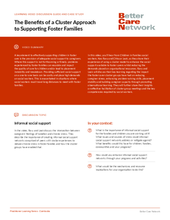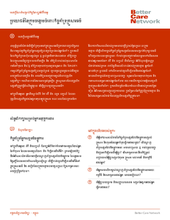A key element to effectively supporting children in foster care is the provision of adequate social support to caregivers. Where this support is not forthcoming or timely, problems experienced by foster families can escalate and impact the quality of care for children and/or lead to placement instability and breakdown. Providing sufficient social support on a one-to-one basis can be costly and place high demands on social workers. This is exacerbated in situations where social workers must travel long distances to meet with foster families.
In this video, you’ll hear from Children in Families social workers, Keo Ravy and Chhoun Leak, as they share their experience of using a cluster model to enhance the social support available to foster carers whilst reducing the demands placed on organisational resources. Ravy and Leak will discuss their key learning regarding the impact the foster carer cluster groups have had on reducing caregiver stress, enhancing problem-solving skills, placement stability and building caregiver capacity through promoting observational learning. They will further share their insights on effective facilitation of cluster group meetings and the key competencies required by social workers.
This video is part of a series of practitioner learning videos from Cambodia.


